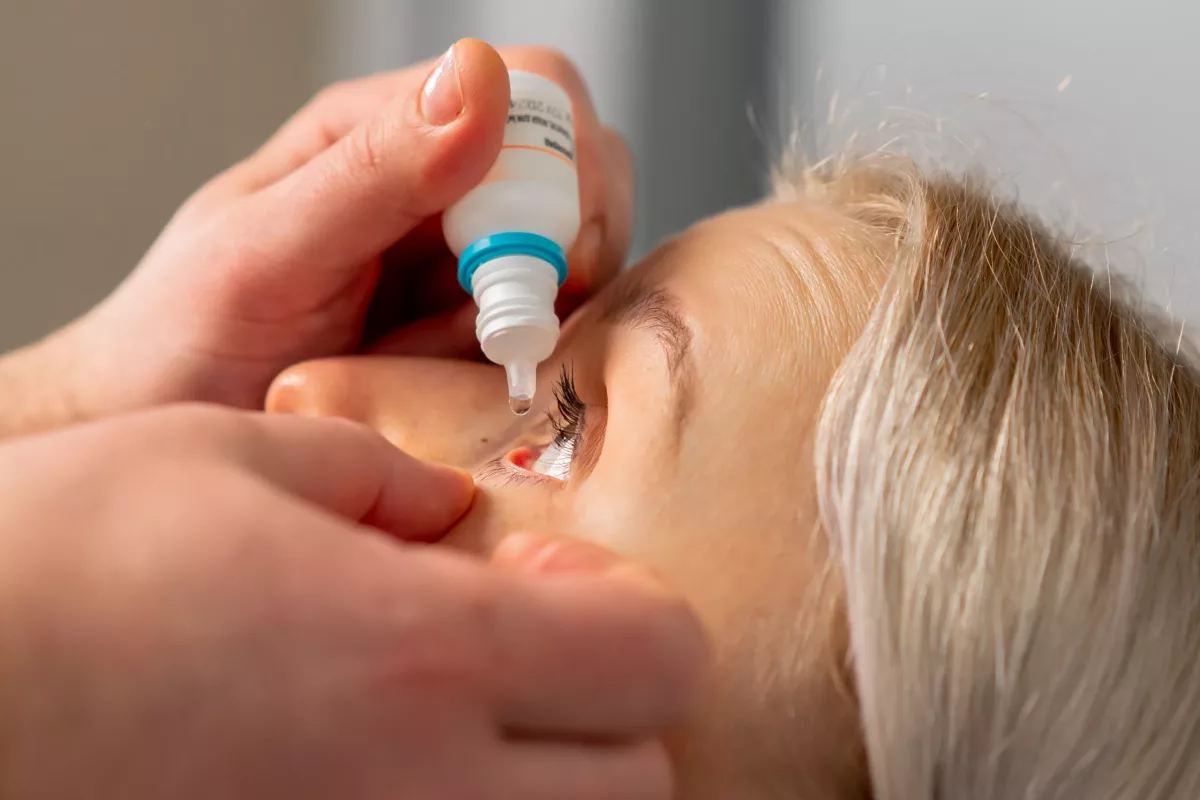An eye disorder that causes blurred vision and reduced central vision is called macular degeneration. There are two types of the condition, such as dry macular degeneration and wet macular degeneration. While the dry type of condition occurs due to the breakdown of a part of the retina (also called the macula), the wet type develops due to blood vessels that leak fluid or blood into the macula.
Macular degeneration may affect either one or both eyes. Over time, it reduces the ability to perform certain things (including reading, driving, recognizing faces, and others). However, people with this condition do not lose all their sight. Usually, this condition affects central vision.
The only way to delay the loss of vision is early diagnosis and proper treatment.
Symptoms
The symptoms of dry macular degeneration are usually painless and develop slowly. Check below some examples:
- Vision distortions (including straight lines seeming bent)
- Decreased central vision in one or both eyes
- Need for brighter light, especially when reading or performing close-up work
- Difficulty adapting to low light levels
- Blurred vision
- Inability to recognize faces
- A blind spot or blurry spot in the field of vision
However, dry macular degeneration may affect one or both eyes (usually simultaneously). When only one eye is affected, most people do not experience any vision changes because the good eye compensates for the vision. Moreover, both types of macular degeneration do not cause total blindness because they only affect central vision.
In general, there are two types of this condition such as dry macular degeneration and wet macular degeneration. However, the dry type of this condition can progress to the wet type. Wet macular degeneration happens when blood vessels grow and begin to leak under the retina. Most people develop the dry type of the condition. In addition, wet macular degeneration may cause sudden changes in vision compared to the dry type of the condition.
It is advised to see a doctor if you notice changes such as blind spots or distortion in the central vision, or lose the ability to see fine details.
Causes
Healthcare providers do not fully understand the exact cause of dry macular degeneration. They think a combination of genes and other factors contributes to it. These include obesity (excessive body weight), poor diet, smoking, and others. However, aging is one factor that makes people more prone to developing dry macular degeneration. It occurs because the macula (the central area of the retina) becomes thin and may lose cells responsible for central vision.
The second type of the condition often happens in people who already have dry macular degeneration. Approximately 20% of people with the dry type of the disease develop the wet type. Wet macular degeneration may develop in different ways. For example:
- Blindness caused by irregular growth of the blood vessels – Sometimes, people may develop some blood vessels that grow from the choroid under and into the macula. As a result, it may lead to fluid leakage from these blood vessels, which affects the function of the retina.
- Fluid buildup in the back of the eye – In some people, fluid begins to leak from the choroid between the thin cell layer (the retinal pigment epithelium) and the retina or within the retina’s layers. Therefore, it causes abnormalities in the macula layers that cause vision changes or distortion.
Risk Factors
While it is not possible to determine the exact cause of the disease, doctors have identified some factors that could increase the risk of developing macular degeneration. For example:
- Age – The risk of macular degeneration often increases with aging, which makes people over 50 years old more likely to develop it.
- Family history and genetics – Some research has found that this condition has a genetic component. It means the condition may run in families.
- Race – This condition is more commonly diagnosed in white people than in other races.
- Smoking – people who smoke cigarettes or are exposed to secondhand smoke for long periods are at higher risk of developing macular degeneration.
- Obesity – Some studies suggest that people with excessive body weight are more prone to develop this eye disorder.
- Cardiovascular disease – Those who have heart or blood vessel disease are at increased risk of macular degeneration.
What Are The Complications of Macular Degeneration?
People who develop wet macular degeneration are at higher risk of developing depression and social isolation. Others may have visual hallucinations. This condition is known as Charles Bonnet syndrome. If you suspect you have dry macular degeneration, do not hesitate to see a doctor because the wet type of the disease may fast cause a complete loss of central vision.
How to Prevent Macular Degeneration?
To find this condition, regular eye checkups are recommended. Check below some tips that may reduce the risk of developing this eye disorder:
- Manage existing chronic health conditions – These include diabetes, hypertension (high blood pressure), and others.
- Quit smoking – If you cannot stop smoking, discuss it with your healthcare professional.
- Try to get and maintain a healthy weight – You should perform physical exercises every day. Aim for at least 30 minutes of physical exercise.
- Dietary changes – Dietitians may recommend adding more fresh fruits, vegetables, and whole grains to your diet. Furthermore, you should include in to diet fish (omega-3 fatty acids) may help reduce the risk of macular degeneration. However, walnuts also contain omega-3 fatty acids.
Diagnosis
First, doctors will evaluate your medical and family history. Thereafter, they may ask some questions about the symptoms and perform some tests to confirm the condition and rule out other conditions that cause similar symptoms. Check below some tests often involved in macular degeneration diagnosis:
- Examination of the back of the eye – This procedure involves eye drops used to dilate the eye. Then, a specific tool is used to examine the back of the eye. Doctors usually suspect macular degeneration when they find multiple drusen (yellow deposits under the retina).
- Testing central vision – During this test, doctors use an Amsler grid. It helps identify changes in the center of the vision field.
- Fluorescein angiography – This test involves a dye that is injected into a vein in the arm. Thereafter, doctors use a specific camera that shows this dye through the blood vessels. This test may show retinal or blood vessel changes.
- Indocyanine green angiography – This test is very similar to fluorescein angiography, but it helps identify types of macular degeneration.
- Optical coherence tomography – It is a noninvasive imaging test used to get cross-sectional images of the retina. It helps identify fluid buildup from leaking blood vessels and areas of thinning, swelling, or thickening.
Treatment
Nowadays, there are no options that may help reverse the damage caused by this eye disorder. Check below some treatments often recommended by doctors to slow damage to the macula:
Vitamin Supplements
According to research from the Age-Related Eye Disease Study 2 (AREDS2), a high-dose formulation of antioxidant vitamins and minerals may help decrease the risk of complete central vision loss. These include:
- 500 milligrams (mg) of vitamin C
- 400 international units (IU) of vitamin E
- 10 mg of lutein
- 2 mg of zeaxanthin
- 80 mg of zinc oxide
- 2 mg of copper as cupric oxide
Previous supplements may not work so well. Discuss it with your healthcare professional if you have an early form of macular degeneration.
Surgery
Healthcare professionals may recommend surgery to implant a telescopic lens in one or both eyes in people with advanced dry macular degeneration. These lenses look like small plastic tubes that help magnify the field of vision. In some cases, telescopic lenses help improve both distance and close-up vision.
Frequently Asked Questions
Can you stop the progression of macular degeneration?
Unfortunately, there is no way to reverse the damage caused by this eye disorder. There are a lot of clinical trials in progress. However, people with early stages of macular degeneration may take vitamin supplements, adopt a healthy diet, and quit smoking.
Can high blood pressure cause macular degeneration?
Generally, hypertension (high blood pressure) is a risk factor for macular degeneration. If you have chronic high blood pressure, you should inform your healthcare professional.
What not to do with macular degeneration?
People who develop macular degeneration should limit or avoid saturated or trans fats from red meat, whole milk, fried foods, and baked goods. Previous foods may increase vision damage. This document does not contain all possible foods or drinks that should be avoided by people with macular degeneration. If you have additional questions, ask your healthcare provider.




